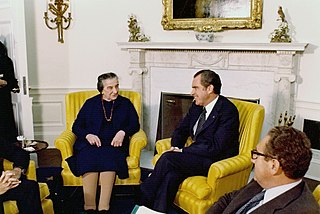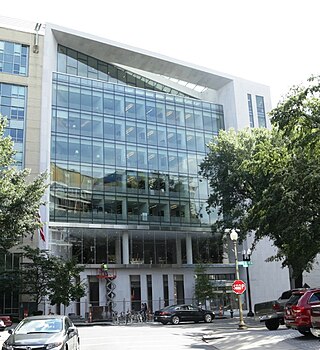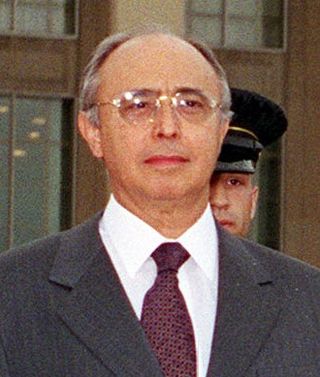
A think tank, or policy institute, is a research institute that performs research and advocacy concerning topics such as social policy, political strategy, economics, military, technology, and culture. Most think tanks are non-governmental organizations, but some are semi-autonomous agencies within government, and some are associated with particular political parties, businesses or the military. Think tanks are often funded by individual donations, with many also accepting government grants.

The Nixon Doctrine was the foreign policy doctrine of Richard Nixon, the 37th president of the United States from 1969 to 1974. It was put forth during a press conference in Guam on July 25, 1969, by Nixon, and later formalized in his speech on Vietnamization on November 3, 1969.

The Jewish Institute for National Security of America (JINSA), formerly named the Jewish Institute for National Security Affairs, is a Washington, D.C.-based, non-profit and pro-Israel lobby and think tank.

National security, or national defence, is the security and defence of a sovereign state, including its citizens, economy, and institutions, which is regarded as a duty of government. Originally conceived as protection against military attack, national security is widely understood to include also non-military dimensions, such as the security from terrorism, minimization of crime, economic security, energy security, environmental security, food security, and cyber-security. Similarly, national security risks include, in addition to the actions of other nation states, action by violent non-state actors, by narcotic cartels, organized crime, by multinational corporations, and also the effects of natural disasters.

The Center for Strategic and International Studies (CSIS) is an American think tank based in Washington, D.C. From its founding in 1962 until 1987, it was an affiliate of Georgetown University, initially named the Center for Strategic and International Studies of Georgetown University. The center conducts policy studies and strategic analyses of political, economic and security issues throughout the world, with a focus on issues concerning international relations, trade, technology, finance, energy and geostrategy.
Balthazar Bigirimana was a Burundian politician and diplomat.

The Foreign Affairs Council (FAC) is a configuration of the Council of the European Union that convenes once a month. Meetings bring together the foreign ministers of the member states. Ministers responsible for European affairs, defence, development or trade also participate depending on the items on agenda. The configuration is unique in that is chaired by the High Representative of the Union for Foreign Affairs and Security Policy (HR/VP) rather than the member state holding the presidency of the Council of the European Union. There is one exception, when the FAC meets in the configuration of ministers responsible for trade (FAC/Trade), with the presiding member state's minister chairing the meeting.

In the United States Government, the Bureau of European and Eurasian Affairs (EUR) is part of the United States Department of State, charged with implementing U.S. foreign policy and promoting U.S. interests in Europe and Eurasia, as well as advising the Under Secretary of State for Political Affairs. It is headed by the Assistant Secretary of State for European and Eurasian Affairs.
Vice Admiral Ko Tun-hwa was a geostrategist, former Vice Minister of Defense of Taiwan and former National Policy Advisor to the President of the Taiwan. Admiral Ko Tun-hwa graduated in 1957 with the first class of the Naval Command Course, the first course for international officers, at the United States Naval War College.

Relations have always been strong between Azerbaijan and Turkey, the only two predominantly Turkic countries located west of the Caspian Sea. Former Azerbaijani president Heydar Aliyev often described the two as being "one nation, two states."

Ministry of Foreign Affairs of Azerbaijan is a Cabinet-level governmental agency of Azerbaijan Republic in charge of conducting and designing the country's foreign policy.

Geraldo Magela da Cruz Quintão is a Brazilian politician. Magela also served as the Brazilian Minister of Defence from 2000 to 2002.
Lieutenant-General Talat MasoodHI(M) SBt is a retired three-star rank army general, a political commentator, and a mechanical engineer.

The Ministry of Defence of the Republic of Azerbaijan or MN is an Azerbaijani government agency that is associated with the Azerbaijani military. The ministry is responsible for keeping Azerbaijan defended against external threats, preserving its territorial integrity, waging war on behalf of Azerbaijan, and the surveillance of the Azerbaijani sector of the Caspian Sea sea and airspace. The Minister of Defense is appointed and removed from the post by the Commander-in-chief of the Azerbaijani Armed Forces, the President of Azerbaijan.

Ramona Nicole Mănescu is a Romanian politician and lawyer. From 24 July 2019 to 4 November 2019, she served as minister of Foreign Affairs in the Romanian Government. She was a Member of the European Parliament serving 2007 to 2013 and 2014 to 2019 from the National Liberal Party, active within the European People's Party. As part of this group she is a member of the European Parliament Committee on Foreign Affairs, vice-chair in the Delegation for relations with the Mashreq countries and a substitute member in the Committee on transport and tourism and in Delegation for relations with the Arab Peninsula.
The Partnership for Peace Consortium is a network of over 800 defense academies and security studies institutes across 60 countries. Founded in 1998 during the NATO Summit, the PfPC was chartered to promote defense institution building and foster regional stability through multinational education and research, which the PfPC accomplishes via a network of educators and researchers. It is based at the George C. Marshall European Center for Security Studies in Garmisch, Germany. According to the PfPC Annual Report of 2012, in 2012 eight hundred defense academies and security studies institutes in 59 countries worked with the PfPC in 69 defense education/defense institution building and policy-relevant events. The Consortium publishes an academic quarterly journal CONNECTIONS in English and Russian. The journal is run by an international Editorial Board of experts and is distributed to over 1,000 institutions in 54 countries.

The relationship between Azerbaijan and NATO started in 1992 when Azerbaijan joined the newly created North Atlantic Cooperation Council. Considerable partnership between NATO and Azerbaijan dates back to 1994, when the latter joined Partnership for Peace program. Azerbaijan established a diplomatic Mission to NATO in 1997 by the Presidential Decree on 21 November.
Aura Rosario Rosal López de Mejía was the wife of former Guatemalan President Óscar Humberto Mejía Víctores and First Lady of Guatemala from 1983 to 1986.
The following lists events that happened in 1924 in El Salvador.

Armenia and the North Atlantic Treaty Organization (NATO) have maintained a formal relationship since 1992, when Armenia joined the North Atlantic Cooperation Council. Armenia officially established bilateral relations with NATO in 1994 when it became a member of NATO's Partnership for Peace (PfP) programme. In 2002, Armenia became an Associate Member of the NATO Parliamentary Assembly.














